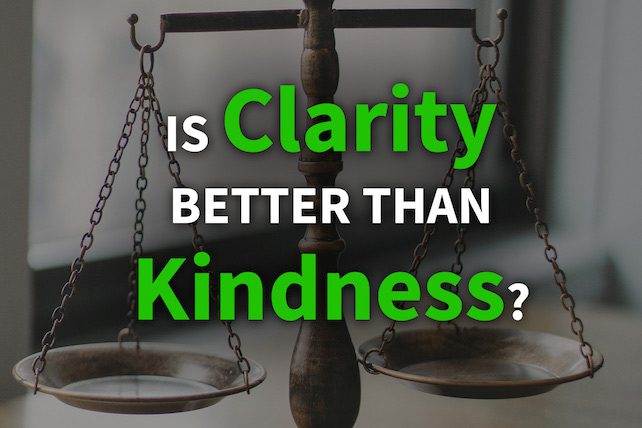 I recall a former pastor of mine (a pastor who was most impactful in discipling and leading me into greater emotional and spiritual maturity) often stating, “Clarity is better than kindness.” I felt conflicted when I first heard this and could see by the confused expressions of others that they were wrestling as well. It was the kind of pronouncement that caused people to stop short and consider whether or not this was actually a valid statement. It felt both true and false all at the same moment—at first, mostly false. I thought, “Isn’t it actually the other way around? Isn’t kindness better than clarity?”
I recall a former pastor of mine (a pastor who was most impactful in discipling and leading me into greater emotional and spiritual maturity) often stating, “Clarity is better than kindness.” I felt conflicted when I first heard this and could see by the confused expressions of others that they were wrestling as well. It was the kind of pronouncement that caused people to stop short and consider whether or not this was actually a valid statement. It felt both true and false all at the same moment—at first, mostly false. I thought, “Isn’t it actually the other way around? Isn’t kindness better than clarity?”
Over many decades, we have been influenced to be accommodating and unquestioning regarding the choices of others—“Don’t judge” is a common phrase in our culture. Truth and clarity feel like major affronts to be avoided at all costs, no matter how gently or lovingly they are expressed.
Fast-forward to the past few years. As I equip and teach all around the country, I am hearing a desperate refrain of similar statements/questions:
- “I have a family in my church with a 9-year-old daughter who told her parents she’s trans. We have two kids in our youth group who openly identify as gay, and another girl who wants to be called Jack and wants us to use they/them pronouns, and those are just the ones I know about. How do I pastor these individuals and my church through these situations?”
- “My son is in 2nd grade with a little boy who came back after summer break claiming to be a girl, and his mother supports it. Everyone is expected to celebrate and use she/her pronouns”.
- “There’s a girl in our public school who identifies as a cat. How do I pastor our families (especially our young people) through this kind of confusion?”
- “My friend who teaches at our rural public school was reprimanded by the administration because one of his students who identifies as a cat meowed at him and he didn’t meow back.”
- “Our son is in his third year of college. He came home for Christmas break. I was surprised to see a young woman when I opened the door. It was our son. How do we love without affirming?”
Of course, my pastor from years ago believed that Christians need to be both clear regarding truth and kind in our messaging and methods. In his statement and emphasis on the need for clarity, he was addressing a growing weakness, even within many evangelical churches. He was witnessing a drift away from clear, unadulterated truth being preached and taught as the solid and immoveable foundation upon which every other aspect of our life and witness are built—drifting towards a more “nuanced” and gentler approach, sometimes referred to as “seeker sensitive”.
If subjective and shifting ideas of kindness are the framework through which we understand truth, it’s no wonder that truth is now viewed as situational. It’s the reason we hear phrases like “my truth”, “your truth”, and “her truth.” As if truth were utterly malleable, with no single point of reference or source.
As I travel around the country, teaching at conferences, preaching, and equipping leadership teams on topics of authentic community, stewarding our sexuality, and biblical identity, I witness the erosion of truth being replaced with something called “kindness” or “love” (but it is actually neither).
Common catchphrases we hear are “love is love” and “love your neighbor”. However, when boiled down to their intended meaning and logical end, they are simply slogans for “don’t question anything I’m doing,” “don’t judge,” and “unless you’re celebrating my decision, don’t speak.” Following that line of reasoning, then, of course, there would be no such thing as absolute truth, and every opinion is equal to another, even if untrue. But that isn’t the message of the Bible. Far from it!
From my vantage point, nowhere do we see an erosion of truth and compromise more than in the arena of human sexuality and identity. While some within the Church point to those who identify as LGBTQ+ as somehow nearly exclusively responsible for the erosion of societal norms, I believe hidden sexual sin, hookup culture, and pornography addiction among heterosexuals within the Church are much more insidious and damaging issues.
This isn’t to say that LGBTQ+ sin should be ignored or given a pass. Genuine biblical love says otherwise. These behaviors are destructive, and the ideology has become a powerful driving force everywhere within society, as well as in many churches. These sins must be addressed because of love and concern for those who have not surrendered their lives to Jesus, but certainly not to the exclusion of other sinful practices.
We need the clarity of God’s truth and his design for our sexuality and identity—both for those who are opposite-sex attracted, as well as those who experience same-sex attraction, identity confusion, or gender dysphoria. We also need God’s mercy and love. In Romans 2:4, Paul says that “it is the kindness of God that leads to repentance.”
Biblical kindness does not affirm sin, false identity, or what separates a person from God. Rather, genuine kindness loves a person too much to stay silent, or speak untrue affirmations.

